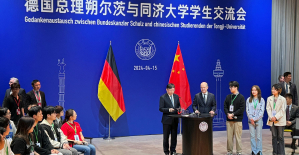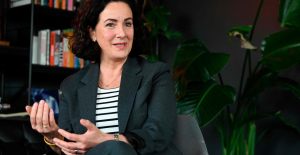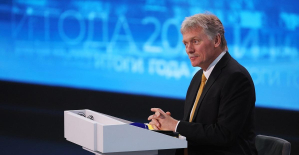The needs in the schools are so great that quick solutions are longed for. However, it remains unclear which measures are to be taken to overcome the diverse misery and whether the network of competences between the federal, state and local authorities will be changed. What's more: the planned "education summit" next Tuesday raises only low expectations. Numerous department heads from the countries would not take part, various media reports.
The most urgent problems are the shortage of teachers and the deficits in digitization. The Education and Training Teachers' Association (VBE) complains about a nationwide shortage of around 50,000 teachers. Federal Minister of Education Bettina Stark-Watzinger (FDP) told "Bild am Sonntag" that the top priority was "to bring more teachers into the profession, to reduce the number of students who drop out in the teaching profession and to make the teaching profession more attractive". New teachers are to be lured with financial allowances. “Performance bonuses are already possible in many cases today. It would also be conceivable to take further training courses and the quality of teaching into account when determining salary levels. The federal states have to decide that,” said Stark-Watzinger.
For the proposal for a bonus model, the minister received applause from her own people, but not from her coalition partner: “Good performance should also pay off for teachers. Performance-related remuneration increases the attractiveness of the profession and the quality of the teaching," emphasized Ria Schröder, spokeswoman for education policy for the FDP parliamentary group, when asked by WELT.
On the other hand, Kai Gehring (Greens), Chairman of the Education Committee in the Bundestag, expressed a negative view: "The payment of teachers in this country is very good in international comparison and performance bonuses raise numerous unresolved questions - from criteria and measurement to the role of the school management to the consequences for colleges - , which is why I advise the federal, state and local governments to focus on improving working conditions.”
Union faction vizin Nadine Schön (CDU) also reacted critically: “So far, the only suggestion I have known about the problems of our education system is performance bonuses for teachers. But that is an original matter for the federal states and only distracts from the real problems and responsibilities.” In principle, according to the ideas of the traffic light groups, cooperation in federalism should be improved. “We need a cooperation requirement between the federal and state governments instead of a cooperation ban. All stakeholders need to be able to work closely together to address the challenges of education. Uniform nationwide quality standards are essential," explained FDP education expert Schröder.
At the same time, there is a need for “a transfer of competence to the local schools. They need freedom of choice and resources so that they don't suffocate in bureaucracy with every new tablet". Schröder calls for mandatory training for the digital "update" in the classroom. In addition, schools need IT specialists for administration and troubleshooting of digital end devices. Teachers must be freed from bureaucracy and supported by multi-professional teams.
SPD parliamentary group leader Sönke Rix demanded nothing less from the summit than a "start" for schools in disadvantaged locations, the legal right to all-day care, the digital pact 2.0 and the pact for vocational schools as well as for the agreed permanent working group of the federal, state and local governments. "I very much hope that the education summit will not just be a pure PR event, but that the minister will bring concrete financial commitments for these projects," said Rix.
Greens MP Gehring calls for an "agreement for a new, nationwide educational policy effort". In his view, educational federalism must be made “more cooperative and more targeted”.
Christian Democrat Schön described the summit as “blatant mockery”. One could speak "at most of a non-binding meeting at the valley station to talk comfortably about the task mountain". No clear goals were formulated in advance. "There is neither a clear agenda setting, nor do I expect solutions for the diverse challenges of the education system on Tuesday," says Schön.
Germany's education system is being run down more and more. The high school dropout rate is a clear indicator of this. Tens of thousands of young people don’t even manage to graduate from secondary school every year – and “the quota still embellishes the picture,” says WELT chief economist Dorothea Siems.
Source: WELT/ Dorothea Siems
Left faction vizin Nicole Gohlke complained about "pithy sayings", instead you need "smart" action. “We can't afford to set fancy goals that would lead to endless clamor between the federal and state governments. The education system no longer has this time if we want to turn things around,” says Gohlke.
Skepticism prevails in the AfD faction. "Without a hiring and restructuring offensive, we don't even need to talk about digitization. The federal and state governments must dig into their coffers together instead of continuing to pass the buck on to each other," said their school policy spokesman Götz Frömming. He warned against a "further erosion of educational federalism". The federal government has “neither the legal nor the technical competence to offer better solutions to the problems in the school system”.
The national chairman of the Education and Training Association (VBE), Gerhard Brand, calls for “urgently noticeable relief from administrative work and everything that does not relate to the original teaching” in order to “keep the teachers healthy in the system”. They would need support from multi-professional teams for individual support, as well as health and administrative professionals, alongside additional funding.
"If they can't be offered any prospects that things will get better again, it will become increasingly difficult in the long run to motivate them to work overtime," Brand warned. The VBE chairman praises the education summit, but still considers the understanding at the state level in the conference of ministers of education to be essential.
"Kick-off" is WELT's daily news podcast. The most important topic analyzed by WELT editors and the dates of the day. Subscribe to the podcast on Spotify, Apple Podcasts, Amazon Music, Google Podcasts, among others, or directly via RSS feed.

 Germany: abortions should be authorized up to 12 weeks, concludes a commission launched by Olaf Scholz
Germany: abortions should be authorized up to 12 weeks, concludes a commission launched by Olaf Scholz Knife attack in Australia: who are the two French heroes congratulated by Macron?
Knife attack in Australia: who are the two French heroes congratulated by Macron? Faced with an anxious Chinese student, Olaf Scholz assures that not everyone smokes cannabis in Germany
Faced with an anxious Chinese student, Olaf Scholz assures that not everyone smokes cannabis in Germany In the Solomon Islands, legislative elections crucial for security in the Pacific
In the Solomon Islands, legislative elections crucial for security in the Pacific Covid-19: everything you need to know about the new vaccination campaign which is starting
Covid-19: everything you need to know about the new vaccination campaign which is starting The best laptops of the moment boast artificial intelligence
The best laptops of the moment boast artificial intelligence Amazon invests 700 million in robotizing its warehouses in Europe
Amazon invests 700 million in robotizing its warehouses in Europe Inflation rises to 3.2% in March due to gasoline and electricity bills
Inflation rises to 3.2% in March due to gasoline and electricity bills Against drug trafficking, the mayor of Amsterdam advocates the regulation of cocaine
Against drug trafficking, the mayor of Amsterdam advocates the regulation of cocaine Hachette Livre removes Isabelle Saporta from management of Fayard
Hachette Livre removes Isabelle Saporta from management of Fayard Where is the MSC Aries, the ship boarded by Iran?
Where is the MSC Aries, the ship boarded by Iran? Denis Olivennes at Le Figaro: “CMI France discusses with Natacha Polony the future of Marianne”
Denis Olivennes at Le Figaro: “CMI France discusses with Natacha Polony the future of Marianne” 2024 Candidates Chess Tournament: Relive the Crucial Nepo-Gukesh Game
2024 Candidates Chess Tournament: Relive the Crucial Nepo-Gukesh Game Borgo, by Stéphane Demoustier: locked outside
Borgo, by Stéphane Demoustier: locked outside Release of hostages and immediate ceasefire: at the Venice Biennale, the Israeli pavilion resonates with Gaza
Release of hostages and immediate ceasefire: at the Venice Biennale, the Israeli pavilion resonates with Gaza Two Russian artists declared “terrorists and extremists” because of a play
Two Russian artists declared “terrorists and extremists” because of a play Skoda Kodiaq 2024: a 'beast' plug-in hybrid SUV
Skoda Kodiaq 2024: a 'beast' plug-in hybrid SUV Tesla launches a new Model Y with 600 km of autonomy at a "more accessible price"
Tesla launches a new Model Y with 600 km of autonomy at a "more accessible price" The 10 best-selling cars in March 2024 in Spain: sales fall due to Easter
The 10 best-selling cars in March 2024 in Spain: sales fall due to Easter A private jet company buys more than 100 flying cars
A private jet company buys more than 100 flying cars This is how housing prices have changed in Spain in the last decade
This is how housing prices have changed in Spain in the last decade The home mortgage firm drops 10% in January and interest soars to 3.46%
The home mortgage firm drops 10% in January and interest soars to 3.46% The jewel of the Rocío de Nagüeles urbanization: a dream villa in Marbella
The jewel of the Rocío de Nagüeles urbanization: a dream villa in Marbella Rental prices grow by 7.3% in February: where does it go up and where does it go down?
Rental prices grow by 7.3% in February: where does it go up and where does it go down? Europeans: the schedule of debates to follow between now and June 9
Europeans: the schedule of debates to follow between now and June 9 Europeans: “In France, there is a left and there is a right,” assures Bellamy
Europeans: “In France, there is a left and there is a right,” assures Bellamy During the night of the economy, the right points out the budgetary flaws of the macronie
During the night of the economy, the right points out the budgetary flaws of the macronie Europeans: Glucksmann denounces “Emmanuel Macron’s failure” in the face of Bardella’s success
Europeans: Glucksmann denounces “Emmanuel Macron’s failure” in the face of Bardella’s success These French cities that will boycott the World Cup in Qatar
These French cities that will boycott the World Cup in Qatar Bundesliga: Naby Keita suspended by Werder Bremen until the end of the season
Bundesliga: Naby Keita suspended by Werder Bremen until the end of the season Euro 2024: the Blues reveal their opponents for friendlies in June
Euro 2024: the Blues reveal their opponents for friendlies in June Cycling: De Marchi wins the 2nd stage of the Tour of the Alps
Cycling: De Marchi wins the 2nd stage of the Tour of the Alps Paris Olympics 2024: Joris Daudet (BMX) candidate to be French flag bearer
Paris Olympics 2024: Joris Daudet (BMX) candidate to be French flag bearer


















